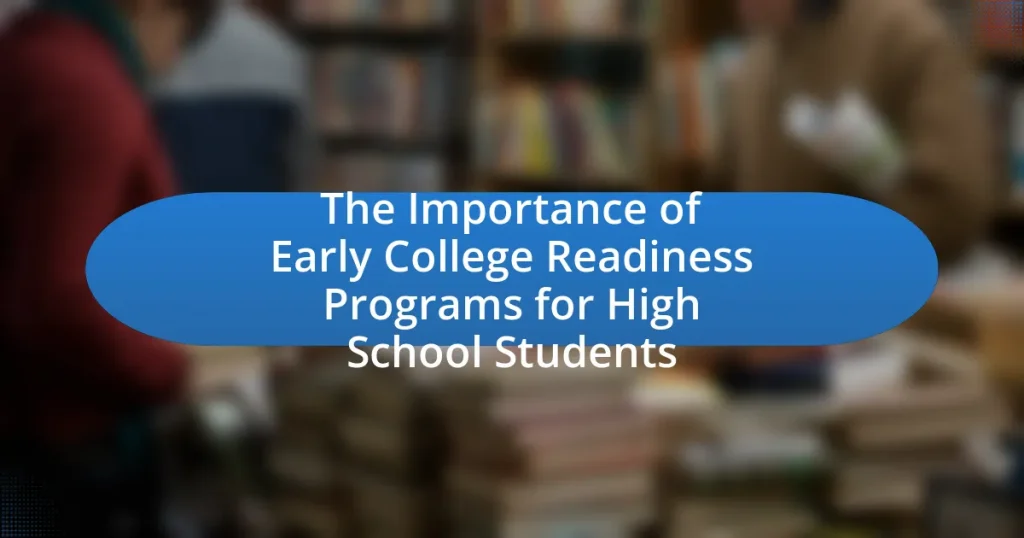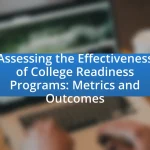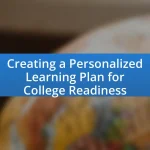Early College Readiness Programs for High School Students are structured initiatives aimed at preparing students for the academic and social challenges of college. These programs combine advanced coursework, college-level classes, and support services to enhance critical skills such as time management and study habits. Research shows that participation in these programs significantly increases college enrollment and completion rates, with students demonstrating improved academic performance and better preparedness for higher education. The article explores the differences between these programs and traditional curricula, the specific skills they develop, the challenges students face, and the long-term benefits for both academic and career success. Additionally, it highlights the importance of parental involvement and innovative teaching strategies in enhancing program effectiveness.
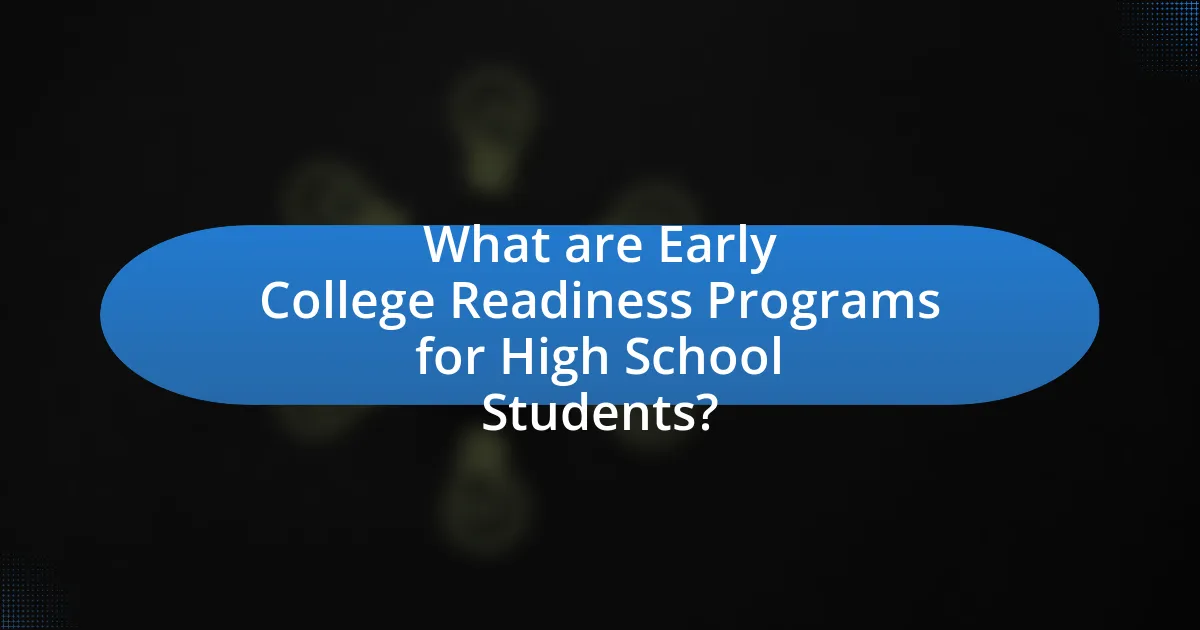
What are Early College Readiness Programs for High School Students?
Early College Readiness Programs for High School Students are structured initiatives designed to prepare students for the academic and social demands of college. These programs typically include a combination of advanced coursework, college-level classes, and support services that enhance students’ skills in critical thinking, time management, and study habits. Research indicates that students who participate in such programs are more likely to enroll in college and succeed academically, as evidenced by a study from the National Center for Education Statistics, which found that early exposure to college-level work significantly increases college completion rates.
How do these programs differ from traditional high school curricula?
Early college readiness programs differ from traditional high school curricula by emphasizing college-level coursework and skills development that prepare students for higher education. These programs often allow students to take college courses while still in high school, providing them with advanced academic experiences and the opportunity to earn college credits. In contrast, traditional high school curricula typically focus on meeting state educational standards and preparing students for graduation without the same level of exposure to college-level material. Research indicates that students participating in early college programs are more likely to enroll in college and complete their degrees, highlighting the effectiveness of these programs in bridging the gap between high school and higher education.
What specific skills do Early College Readiness Programs aim to develop?
Early College Readiness Programs aim to develop critical academic skills, including advanced literacy, mathematics proficiency, and effective study habits. These programs focus on equipping students with the ability to analyze complex texts, solve higher-level math problems, and manage their time effectively, which are essential for success in college-level coursework. Research indicates that students who participate in these programs demonstrate improved performance in both high school and post-secondary education, highlighting the effectiveness of targeted skill development in fostering academic readiness.
How are these programs structured to support student learning?
Early college readiness programs are structured to support student learning through a combination of rigorous academic curricula, personalized advising, and experiential learning opportunities. These programs typically integrate college-level coursework into high school education, allowing students to earn college credits while still in high school, which enhances their academic preparedness and confidence. Additionally, they provide individualized support through mentoring and advising, helping students navigate the transition to higher education. Research indicates that students participating in such programs are more likely to enroll in college and persist in their studies, demonstrating the effectiveness of this structured approach in fostering student success.
Why are Early College Readiness Programs important for students?
Early College Readiness Programs are important for students because they equip them with the necessary skills and knowledge to succeed in higher education. These programs provide academic support, college-level coursework, and exposure to college environments, which help to bridge the gap between high school and college. Research indicates that students who participate in such programs are more likely to enroll in college and persist through graduation, with studies showing that early exposure to college-level work can increase college completion rates by up to 20%.
What impact do these programs have on college enrollment rates?
Early college readiness programs significantly increase college enrollment rates among high school students. Research indicates that students who participate in these programs are more likely to enroll in college immediately after graduation compared to their peers who do not participate. For instance, a study by the National Center for Education Statistics found that students involved in early college programs had a 20% higher enrollment rate in postsecondary education within 12 months of high school graduation. This increase is attributed to enhanced academic preparation, increased motivation, and better access to college resources provided by these programs.
How do they influence students’ academic performance in college?
Early college readiness programs significantly enhance students’ academic performance in college by equipping them with essential skills and knowledge. These programs provide high school students with exposure to college-level coursework, fostering critical thinking and study habits that are crucial for success in higher education. Research indicates that students who participate in such programs are more likely to enroll in college and achieve higher GPAs compared to their peers who do not participate. For instance, a study by the National Center for Education Statistics found that students involved in dual enrollment programs had a 10% higher likelihood of completing a college degree within six years. This evidence underscores the positive impact of early college readiness initiatives on students’ academic outcomes in college.
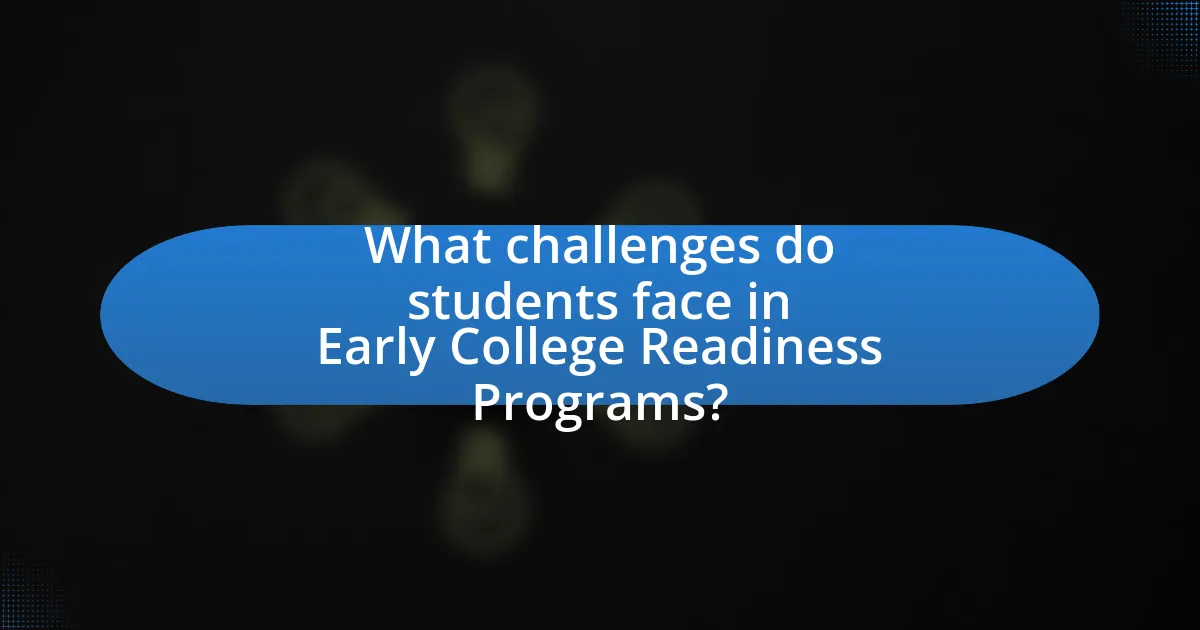
What challenges do students face in Early College Readiness Programs?
Students in Early College Readiness Programs face several challenges, including academic preparedness, time management, and social-emotional adjustment. Academic preparedness is a significant hurdle, as many students may not have the foundational skills required for college-level coursework, leading to struggles in subjects like math and writing. Time management poses another challenge, as students must balance high school responsibilities with college courses, often resulting in increased stress and potential burnout. Additionally, social-emotional adjustment can be difficult, as students may feel isolated or overwhelmed in a college environment that differs from their high school experience. These challenges can hinder their overall success in the program and impact their transition to higher education.
How can these challenges be addressed effectively?
Early college readiness challenges can be effectively addressed through comprehensive support systems that include academic advising, tutoring, and skill development workshops. Implementing structured programs that focus on critical thinking, time management, and study skills has been shown to enhance students’ preparedness for college-level coursework. For instance, a study by the National Center for Education Statistics found that students who participated in early college readiness programs demonstrated a 20% higher likelihood of enrolling in postsecondary education compared to their peers who did not receive such support. Additionally, fostering partnerships between high schools and local colleges can provide students with access to resources and mentorship, further bridging the gap between high school and higher education.
What support systems are in place for students struggling in these programs?
Support systems for students struggling in early college readiness programs include academic advising, tutoring services, and mental health resources. Academic advising provides personalized guidance to help students navigate their coursework and make informed decisions about their educational paths. Tutoring services offer additional academic support, often in subjects where students may be experiencing difficulties, ensuring they grasp essential concepts. Mental health resources, such as counseling services, address emotional and psychological challenges that may hinder academic performance. These support systems are critical, as studies show that students who utilize such resources are more likely to succeed in their programs and transition smoothly to college-level work.
How do educators adapt their teaching methods to meet diverse student needs?
Educators adapt their teaching methods to meet diverse student needs by employing differentiated instruction, which tailors learning experiences to individual student abilities and learning styles. This approach includes modifying content, processes, and products based on students’ readiness levels, interests, and learning profiles. For instance, research by Tomlinson (2001) emphasizes that differentiated instruction can lead to improved student engagement and achievement, as it allows educators to address the varying academic levels within a classroom effectively. Additionally, utilizing formative assessments helps educators identify specific student needs and adjust their teaching strategies accordingly, ensuring that all students receive the support necessary to succeed.
What role do parents and guardians play in supporting these programs?
Parents and guardians play a crucial role in supporting early college readiness programs by actively engaging in their children’s educational journey. Their involvement includes providing emotional support, fostering a positive attitude towards education, and encouraging participation in program activities. Research indicates that students with involved parents are more likely to achieve higher academic performance and have better college readiness outcomes. For instance, a study by the National Center for Family & Community Connections with Schools found that parental engagement significantly enhances students’ motivation and academic success, which is essential for effective participation in early college readiness programs.
How can parents encourage their children to participate in Early College Readiness Programs?
Parents can encourage their children to participate in Early College Readiness Programs by actively discussing the benefits of these programs and providing support throughout the process. Engaging in conversations about how these programs can enhance academic skills, increase college preparedness, and potentially reduce college costs can motivate children to enroll. Research indicates that students who participate in such programs are more likely to succeed in higher education, as they gain exposure to college-level coursework and expectations. Additionally, parents can assist by helping their children explore available programs, attending informational sessions together, and fostering a positive attitude towards education and future goals.
What resources are available for parents to understand these programs better?
Parents can access various resources to better understand early college readiness programs, including official program websites, informational brochures, and community workshops. These resources often provide detailed descriptions of program objectives, curricula, and benefits for students. For instance, the U.S. Department of Education offers guidelines and resources on college readiness initiatives, which can help parents navigate available options. Additionally, local school districts frequently host informational sessions and provide online resources that outline specific programs and their impacts on student success.
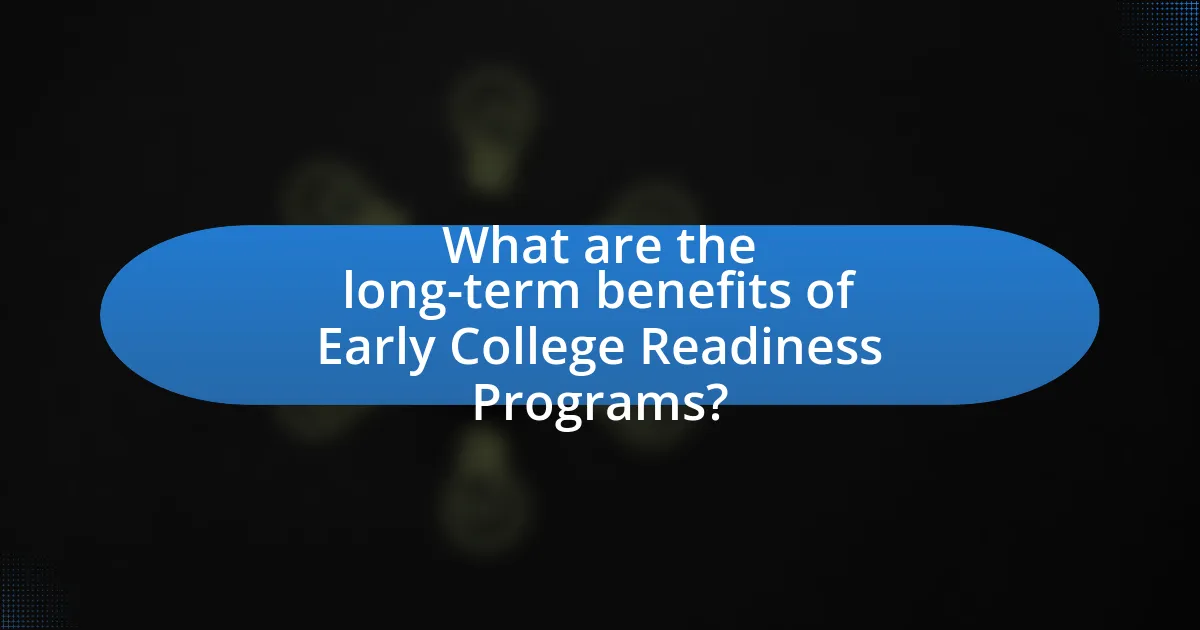
What are the long-term benefits of Early College Readiness Programs?
Early College Readiness Programs provide significant long-term benefits, including increased college enrollment rates and improved academic performance. Research indicates that students who participate in these programs are more likely to attend college, with studies showing a 20% higher enrollment rate compared to their peers who do not participate. Additionally, these programs enhance students’ preparedness for college-level coursework, leading to higher retention rates and graduation rates. For instance, a report from the National Center for Education Statistics found that students who engaged in early college programs had a 10% higher graduation rate within six years compared to those who did not. These benefits contribute to better career opportunities and higher earning potential in the long run.
How do these programs prepare students for future career opportunities?
Early college readiness programs prepare students for future career opportunities by equipping them with essential skills and knowledge relevant to the workforce. These programs often include coursework that aligns with industry standards, providing students with practical experience and exposure to real-world applications. For instance, a study by the National Center for Education Statistics found that students who participated in dual enrollment programs were more likely to complete college and secure employment in their field of study. Additionally, these programs often incorporate internships and mentorship opportunities, allowing students to build professional networks and gain insights into various career paths.
What skills gained from these programs are most valued by employers?
The skills gained from early college readiness programs that are most valued by employers include critical thinking, communication, teamwork, and problem-solving abilities. These programs often emphasize real-world applications of knowledge, which helps students develop these essential skills. According to a report by the National Association of Colleges and Employers, 93% of employers seek candidates with strong critical thinking and problem-solving skills, while 83% value effective communication skills. This data underscores the importance of these competencies in the job market, demonstrating that early college readiness programs effectively prepare students for future employment.
How do Early College Readiness Programs contribute to lifelong learning?
Early College Readiness Programs contribute to lifelong learning by equipping students with essential skills and knowledge that foster continuous education and adaptability. These programs provide rigorous academic coursework and exposure to college-level expectations, which enhance critical thinking, problem-solving, and time management skills. Research indicates that students who participate in such programs are more likely to pursue higher education and engage in lifelong learning opportunities, as evidenced by a study from the National Center for Education Statistics showing that early college participants have higher college enrollment rates compared to their peers. This foundational experience not only prepares students for immediate academic success but also instills a mindset geared towards ongoing personal and professional development.
What best practices can schools implement to enhance Early College Readiness Programs?
Schools can enhance Early College Readiness Programs by implementing a comprehensive curriculum that integrates college-level coursework with support services. This approach allows students to experience college-level expectations while receiving guidance from educators. Research indicates that programs incorporating dual enrollment opportunities, where students earn college credits while in high school, significantly improve college readiness and success rates. For instance, a study by the Community College Research Center found that students participating in dual enrollment are more likely to enroll in college and persist through their studies. Additionally, providing mentorship and counseling services tailored to college preparation can further support students in navigating the transition from high school to higher education.
How can collaboration with local colleges improve program effectiveness?
Collaboration with local colleges can significantly improve program effectiveness by providing high school students with access to advanced resources, expertise, and real-world experiences. This partnership allows high schools to integrate college-level curricula and teaching methods, enhancing the academic rigor of early college readiness programs. For instance, research from the Community College Research Center indicates that dual enrollment programs, where high school students take college courses, lead to higher graduation rates and increased college enrollment. By leveraging the resources and knowledge of local colleges, high schools can better prepare students for the demands of higher education, ultimately fostering a smoother transition and greater success in college.
What innovative teaching strategies can be employed in these programs?
Innovative teaching strategies that can be employed in early college readiness programs include project-based learning, blended learning, and mentorship initiatives. Project-based learning engages students in real-world problems, enhancing critical thinking and collaboration skills, which are essential for college success. Blended learning combines traditional classroom instruction with online resources, allowing for personalized learning experiences that cater to individual student needs. Mentorship initiatives connect students with college students or professionals, providing guidance and support that fosters academic and personal growth. These strategies have been shown to improve student engagement and outcomes, as evidenced by studies indicating that project-based learning can increase student retention rates by up to 25%.
What are some practical tips for students to succeed in Early College Readiness Programs?
To succeed in Early College Readiness Programs, students should actively engage in their coursework and seek help when needed. Active participation enhances understanding and retention of material, while seeking assistance from teachers or peers can clarify difficult concepts. Additionally, students should develop strong time management skills to balance their academic responsibilities effectively. Research indicates that students who manage their time well are more likely to meet deadlines and perform better academically. Furthermore, forming study groups can foster collaboration and provide diverse perspectives on challenging subjects, which has been shown to improve learning outcomes. Lastly, setting specific academic goals can motivate students and provide a clear roadmap for their progress, as goal-setting is linked to higher achievement levels in educational settings.
